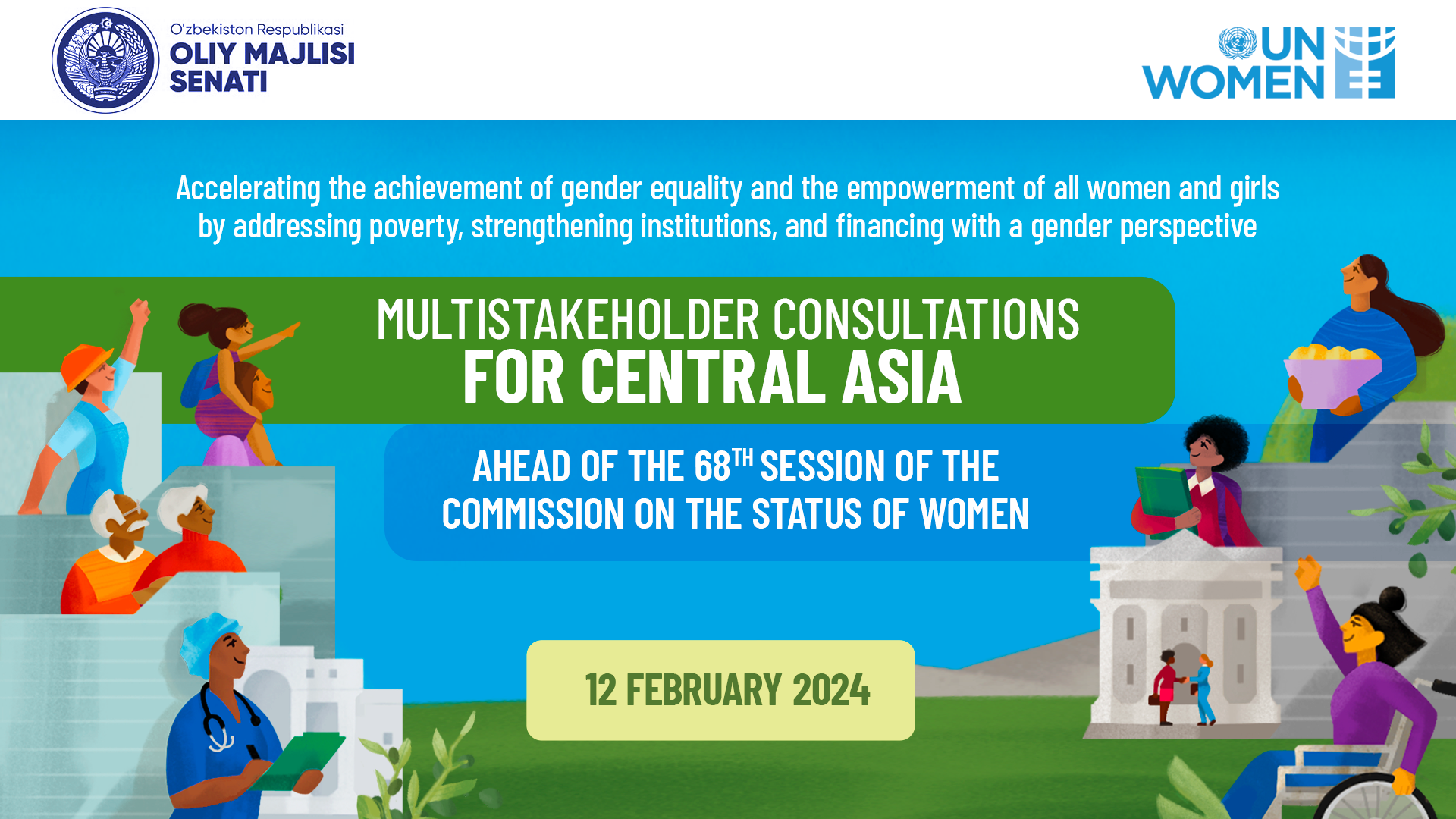Uzbekistan leads sub-regional multistakeholder consultation tackling women’s poverty in the region
Date:

On February 12, the Senate of the Republic of Uzbekistan and UN Women Regional Office for Europe and Central Asia co-hosted a subregional multistakeholder consultation for Azerbaijan and Central Asia ahead of the 68th Session of the UN Commission on the Status of Women (CSW68). Over 200 representatives from ministries, national mechanisms for the advancement of women, civil society, academia, and the private sector gathered to collectively examine and identify actionable regional priorities and put forth recommendations aligned with the CSW68 priority theme, “Accelerating the achievement of gender equality and the empowerment of all women and girls by addressing poverty and strengthening institutions and financing with a gender perspective.”
This year, CSW68 stands at a pivotal moment, seeking to accelerate gender equality and women’s empowerment by tackling poverty and enhancing gender-responsive institutions and financing. The consultation began with an evidence-based summary of gender and poverty in Azerbaijan, Kazakhstan, Kyrgyzstan, Tajikistan, Turkmenistan and Uzbekistan, highlighting the challenges in creating a comprehensive picture due to the lack of gender-sensitive poverty definitions and measurements.
Tanzila Narbaeva, Chairperson of the Senate of Oliy Majlis of the Republic of Uzbekistan, acknowledged the ongoing efforts to expand women’s rights and opportunities and achieve gender equality, as well as the persistent challenges in the region: “I hope that together, we will define today regional priorities and strategies for developing and financing quality social protection for women. This will significantly contribute to formulating specific messages and recommendations for the 68th session of the Committee on the Status of Women.”
Asya Varbanova, UN Women Regional Director for Europe and Central Asia a.i., emphasized the importance of this consultation as it provides the countries from the region a platform for convening, exchanging ideas, best practices, and fostering partnerships. “It serves as an invaluable opportunity to reflect on complex questions and articulate key recommendations for the CSW68 agreed conclusions.”
In addressing women’s poverty, participants identified key challenges and proposed necessary actions. Nargis Saidova, Director of the “Gender and Development”, a non-governmental organization from Tajikistan, mentioned that empowerment of women and girls remains a central concern in Tajikistan. “Women are gaining access to professional education, but this is truer for women in cities than for rural women. Therefore, supporting rural women in pursuing their professional education is crucial. Additionally, women disproportionately spend more hours on domestic labour, which can hinder their economic opportunities. To address this, providing training for women to re-enter the workforce after maternity leave and raising awareness about gender stereotypes in household roles are essential steps.”
Participants also articulated key recommendations for economically empowering women and girls. They discussed the importance of mainstreaming gender in financing and investment schemes.
Nuriddinzoda Ahliddin Nuriddin, Deputy Minister of Economic Development and Trade of the Republic of Tajikistan, and chairperson at the United Nations Special Programme for the Economies of Central Asia (SPECA) Working group on Trade, highlighted: “We should all remember that we live in an era of digital development. If we want women and girls to succeed, they should be given the opportunity to master these skills. To achieve success, we need to empower women and girls in all areas: economically, legally, and politically.”
The sub-regional consultation concluded with a resounding message: eliminating women’s poverty and achieve gender equality require increased investment in women’s education, digital skills, economic empowerment, and active participation in labor force.
Nazgul Sagindykova, Vice-Minister of Labor and Social Protection of the Population Republic of Kazakhstan, affirmed that in order “to eradicate women's poverty and encourage their participation in the labor force, we need to jointly implement four steps: providing quality education for women, empowering women in entrepreneurial activities, enhancing women's access to ownership and control over all forms of property, and expanding economic opportunities for women in rural areas."
Asel Chynbaeva, Special Envoy of the President of the Kyrgyz Republic, argued that comprehensive measures are necessary in order to address women's poverty. “These include creating affordable childcare services and conditions for women’s paid work, revisiting systems that promote women's economic empowerment, supporting women's entrepreneurship in conjunction with digital development, and implementing tax policies.”
Additionally, Asel Chynbaeva emphasized the importance of the expanding regional socio-economic cooperation, the implementation of joint infrastructure projects, and strengthening collective efforts to address challenges related to women’s poverty.
A comprehensive report summarizing key discussions was prepared to capture the outcomes of the event, describing achievements, as well as gaps and challenges. It will outline a forward-looking sub-regional vision ahead of the 68th session of the Commission on the Status of Women.
During February 2024, UN Women Regional Office for Europe and Central Asia organizes a series of sub-regional multistakeholder consultation. The first consultation took place on the 9th of February for the Western Balkans and Türkiye, followed by the second for Central Asia on the 12th of February, and the third for Armenia, Georgia, Moldova, and Ukraine, taking place on the 20th of February.